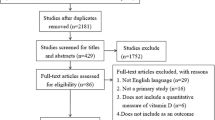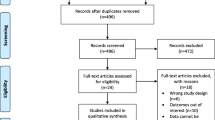Abstract
Background
The role of vitamin D is not only limited to bone health and pathogenesis of chronic diseases. Evidence now suggests that it is also involved in the development of various dementias and Alzheimer’s disease (AD).
Objective
To carry out a systematic review and meta-analysis to evaluate the association between vitamin D levels and increased risk of incident all-cause dementia in longitudinal studies.
Design
We conducted a systematic review and meta-analysis using the electronic bibliographic databases PubMed and Scopus.
Setting
Prospective cohort studies.
Participants
Community-dwelling older adults.
Measurements
Vitamin D serum concentrations were categorized in three groups: normal levels (>50 nmol/L), insufficient levels (25–49.9 nmol/L), and deficient levels (<25 nmol/L). We performed a meta-analysis using the general inverse variance method to calculate the pooled risk of AD and all-cause dementia according to vitamin D levels. Random-effects or fixed-effect model were used to calculate the pooled risk based on the heterogeneity analysis.
Results
Five studies were included in the meta-analysis. The pooled risk of all-cause dementia and AD was significantly higher in those with deficient serum vitamin D level compared to those with normal level (1.33, CI95% [1.15, 1.54], and 1.87, CI95% [1.03, 3.41], respectively). Those with insufficient level also had a higher pooled risk of all-cause dementia and AD, but the strength of association was less robust (1.14 CI95% [1.02, 1.27] and 1.25, CI95% [1.04–1.51], respectively).
Conclusion
We found a gradient effect for the risk of all-cause dementia and AD according to the vitamin D level, with higher risk in those in the deficient levels group and intermediate risk in those with insufficient levels. Our findings were limited by the relatively small number of studies included in the meta-analysis and their geographic restriction.







Similar content being viewed by others

References
Keeney JT, Butterfield DA. Vitamin D deficiency and Alzheimer disease: Common links. Neurobiol Dis [Internet]. 2015;84:84–98. Available from: https://doi.org/10.1016/j.nbd.2015.06.020
Lips P, Van Schoor NM. The effect of vitamin D on bone and osteoporosis. Best Pract Res Clin Endocrinol Metab [Internet]. 2011;25(4):585–91. Available from: https://doi.org/10.1016/j.beem.2011.05.002
Laird E, Ward M, McSorley E, Strain JJ, Wallace J. Vitamin D and bone health; Potential mechanisms. Nutrients. 2010;2(7):693–724.
Meehan M, Penckofer S. The Role of Vitamin D in the Aging Adult Meghan. J Aging Gerontol [Internet]. 2015;2(2):60–71. Available from: https://www.ncbi.nlm.nih.gov/pmc/articles/PMC4399494/pdf/nihms662547.pdf
Goodwill AM, Campbell S, Simpson S, Bisignano M, Chiang C, Dennerstein L, et al. Vitamin D status is associated with executive function a decade later: Data from the Women’s Healthy Ageing Project. Maturitas [Internet]. 2018;107(July 2017):56–62. Available from: https://doi.org/10.1016/j.maturitas.2017.10.005
Bartali B, Devore E, Grodstein F, Kang JH. Plasma vitamin D levels and cognitive function in aging women: The nurses’ health study. J Nutr Heal Aging. 2014;18(4):400–6.
Knekt P, Sääksjärvi K, Järvinen R, Marniemi J, Männistö S, Kanerva N, et al. Serum 25-hydroxyvitamin D concentration and risk of dementia. Epidemiology. 2014;25(6):799–804.
Slinin Y, Paudel ML, Taylor BC, Fink HA, Ishani A, Canales MT, et al. 25-Hydroxyvitamin D levels and cognitive performance and decline in elderly men. Neurology. 2010;74(1):33–41.
Karakis I, Pase MP, Beiser A, Booth SL, Jacques PF, Rogers G, et al. Association of serum Vitamin D with the risk of incident dementia and subclinical indices of brain aging: The framingham heart study. J Alzheimer’s Dis. 2016;51(2):451–61.
Schneider AL, Lutsey PL, Alonso A, Gottesmann RF, Sharrett RA, Carson KA, et al. Vitamin D and Cognitive Function and Dementia Risk in a Biracial Cohort: the ARIC Brain MRI Study Andrea. Eur J Neurol [Internet]. 2014;21(9):1211–1e70. Available from: https://www.ncbi.nlm.nih.gov/pmc/articles/PMC4114998/
Annweiler C, Llewellyn DJ, Beauchet O. Low serum vitamin D concentrations in Alzheimer’s disease: A systematic review and meta-analysis. J Alzheimer’s Dis. 2013;33(3):659–74.
Balion C, Griffith LE, Strffler L, Henderson M, Patterson C, Heckman G, et al. Vitamin D, cognition, and dementia A systematic review and meta-analysis. Neurology. 2012;25(79):1397–405.
Jayedi A, Rashidy-Pour A, Shab-Bidar S. Vitamin D status and risk of dementia and Alzheimer’s disease: A meta-analysis of dose-response. Nutr Neurosci [Internet]. 2018;8305:1–10. Available from: https://sci-hub.tw/10.1080/1028415X.2018.1436639
Wells GA, Shea B. Newcastle-Ottawa Quality Assessment Form for Cohort Studies. 2013;17–8. Available from: http://www.ohri.ca/programs/clinical_epidemiology/oxford.asp
WHO Scientific G. Prevention and management of osteoporosis Report of a WHO Scientific Group. WHO Tech Rep Ser [Internet]. 2003;1–206. Available from: https://apps.who.int/iris/bitstream/handle/10665/42841/WHO_TRS_921.pdf?sequence=1&isAllowed=y
Ross AC, Manson JE, Abrams SA, Aloia JF, Brannon PM, Clinton SK, et al. The 2011 Report on Dietary Reference Intakes for Calcium and Vitamin D from the Institute of Medicine: What Clinicians Need to Know. J Clin Endocrinol Metab [Internet]. 2011;96(1):53–8. Available from: https://www.ncbi.nlm.nih.gov/pmc/articles/PMC3046611/
Afzal S, Bojesen SE, Nordestgaard BG. Reduced 25-hydroxyvitamin D and risk of Alzheimer’s disease and vascular dementia. Alzheimer’s Dement [Internet]. 2014;10(3):296–302. Available from: https://doi.org/10.1016/j.jalz.2013.05.1765
Feart C, Helmer C, Merle B, Herrmann FR, Annweiler C, Dartigues JF, et al. Associations of lower vitamin D concentrations with cognitive decline and long-term risk of dementia and Alzheimer’s disease in older adults. Alzheimer’s Dement. 2017;13(11):1207–16.
Licher S, De Bruijn RFAG, Wolters FJ, Zillikens MC, Ikram MA, Ikram MK. Vitamin D and the Risk of Dementia: The Rotterdam Study. J Alzheimer’s Dis. 2017;60(3):989–97.
Littlejohns TJ, Henley WE, Lang IA, Annweiler C, Beauchet O, Chaves PHM, et al. Vitamin D and the risk of dementia and Alzheimer disease. Neurology. 2014;83(10):920–8.
Moon JH, Lim S, Han JW, Kim KM, Choi SH, Kim KW, et al. Serum 25-hydroxyvitamin D level and the risk of mild cognitive impairment and dementia: The Korean Longitudinal Study on Health and Aging (KLoSHA). Clin Endocrinol (Oxf). 2015;83(1):36–42.
Sommer I, Griebler U, Kien C, Auer S, Klerings I, Hammer R, et al. Vitamin D deficiency as a risk factor for dementia: a systematic review and meta-analysis. BMC Geriatr. 2017;17(1):1–13.
Shen L, Ji HF. Vitamin D deficiency is associated with increased risk of Alzheimer’s disease and dementia: Evidence from meta-analysis. Nutr J [Internet]. 2015;14(76):1–5. Available from: https://doi.org/10.1186/s12937-015-0063-7
Caruana EJ, Roman M, Sánchez JH, Solli1 SP. Longitudinal studies. J Thorac Dis. 2015;7(11):537–40.
Author information
Authors and Affiliations
Corresponding author
Ethics declarations
Ethical standards: No informed conscent was required due to the observational design of our study. No Humans and animals were involved in the present study.
Conflict of interest: The authors declared no potential conflicts of this article.
Electronic supplementary material
Rights and permissions
About this article
Cite this article
Kalra, A., Teixeira, A.L. & Diniz, B.S. Association of Vitamin D Levels with Incident All-Cause Dementia in Longitudinal Observational Studies: A Systematic Review and Meta-analysis. J Prev Alzheimers Dis 7, 14–20 (2020). https://doi.org/10.14283/jpad.2019.44
Received:
Accepted:
Published:
Issue Date:
DOI: https://doi.org/10.14283/jpad.2019.44



